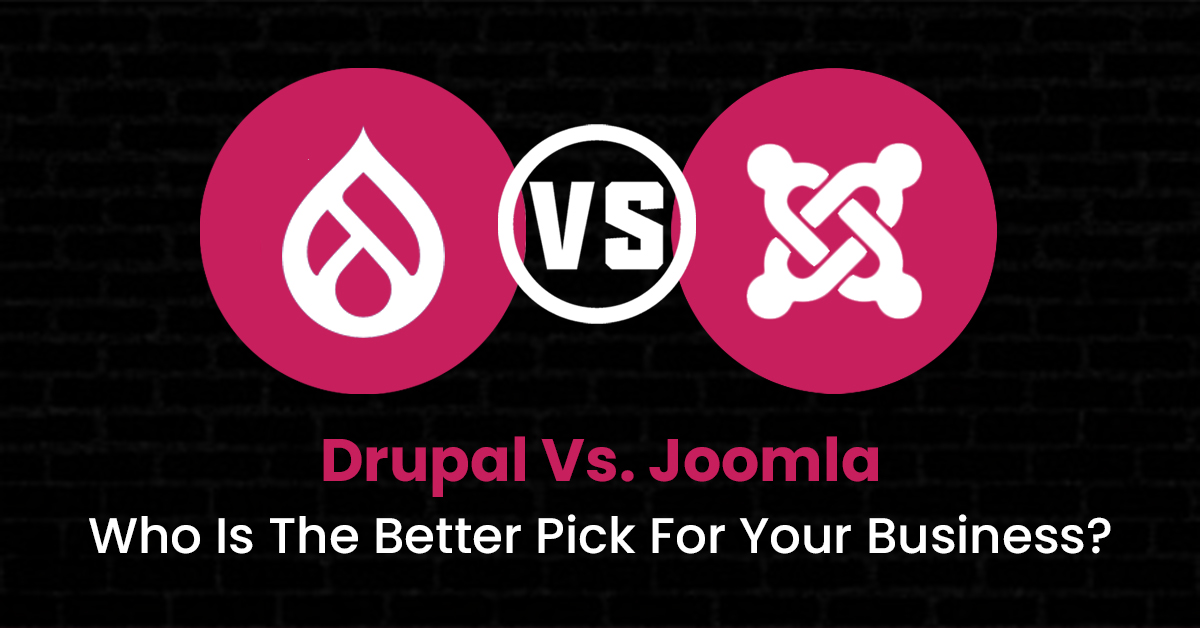
Nowadays, every business wants to build a website to increase its audience, increase conversions, and boost overall productivity. However, a reliable, adaptable, and scalable CMS must be necessary for your business website.
In the technology industry, two options are powerfully attracting attention: Drupal and Joomla. Due to their extensive customizability options. These platforms allow businesses to design the website they want with no restrictions.
Therefore, which choice is better suited? What is going to benefit my business the most? Drupal or Joomla: which should I use? All potential users look for solutions to these questions. You’ll need to look for them after reading this blog. Here we have explained the difference between Drupal and Joomla so that you can determine which one is better suited to your needs.
Joomla and Drupal have become more popular lately and are still used by thousands worldwide. Both platforms have different strengths, and both have their advantages as well as disadvantages. Knowing what they are good at can help you choose the right platform for your project, so first of all, we understand what Joomla and Drupal are.
Joomla is a free, open-source CMS that includes web applications. It has been in the market since 2005 and is one of the most popular platforms worldwide, with over 2.8 million users. It is one of the most widely used frameworks in the world and is available in more than 80 languages.
Joomla is a great option if you want to create a website with the ease of drag-and-drop tools that you can use without any knowledge of programming languages. Joomla has many features, such as WYSIWYG editing, multilingual options, templates, and more. So now it is easy to build any website with Joomla Development company and it has very good support.
Drupal is a CMS that helps owners and developers create and maintain dynamic websites. Since 2001, it’s been available on the market. It is considered one of the market’s most influential and flexible frameworks.
One of Drupal’s main advantages is its versatility, thanks to its massive amount of available modules that can assist you with any project you want to build, no matter how complex it is! It has tools that are very useful for developing complex web applications such as e-commerce websites or even social media platforms.
We specialize in website development and maintenance and don’t charge for consultation calls. Give us a call for some free advice and detailed insights!
The two most common CMS recommended for e-commerce stores are Joomla and Drupal, so it’s essential to understand their capabilities. As a result, we’ve looked at some of their features and thought about how they would fit into an e-commerce store to determine which is easier to use.
Drupal:
Drupal is considered a very user-friendly CMS, providing users with an easy-to-read, intuitive, customizable panel. The system also allows customers to customize their website to include color schemes, images, and other features.
The option to create customizable sections on the front end of a website through the modular add-ons can make things much easier for any new business owner who wants to build an e-commerce store. Users can organize the content of their website by using different modules that allow them to use their unique designs, making it easy for them to create any website they want.
Joomla:
On the other hand, Joomla is considered the most advanced and easy-to-use open-source CMS. It’s completely free, with no limitations or code blocks. This means that users get complete control over how they want their website to look and how they want it to function.
The ability to create a fully custom website for your e-commerce store through an open-source platform can save you money and time when hiring a web developer who can build it for you. However, sometimes using this platform can be overwhelming unless you have extensive experience with website creation.
Joomla:
Regarding Joomla’s customizability, this platform is considered one of the most advanced and easy-to-use open-source CMS. It’s fully customizable and allows users to create a website for their business that looks exactly how they want, without any restrictions or limitations.
In addition, Joomla has one of the largest online communities where you can find thousands of templates you can use for your e-commerce store that has already been tested and proven successful. Moreover, Joomla offers more than 8,000 templates, and 11% of them are specifically designed for e-commerce stores.
Drupal:
You might be shocked to learn that Drupal provides even more module options. Only Drupal has more module options than the over 40,000 available in its official repository.
On top of that, the official Drupal homepage also features a broad collection of themes, with more than 2,600 options that you can choose from. This means that there are countless options for Drupal development, which can be a huge benefit when building an e-commerce store.
Drupal:
Drupal is the perfect CMS to use if you need one that is quick. Every type of web application can be run on the platform because it is loaded with features, making it fast and highly effective.
It is known for being both highly scalable and resource-efficient. Your website should be able to handle more traffic before a slowdown causes it to start slowing down. That is one of the reasons big, busy websites prefer Drupal. Your website’s speed and SEO performance can both be improved with Drupal’s caching system.
Joomla:
On the other hand, since no two CMSs are alike, some options are superior to others in terms of performance. For instance, Joomla provides reliable performance right out of the box. You have the opportunity to enable features like caching and Gzip compression with this CMS, which can reduce loading times even more.
With Joomla, you can upgrade your website’s speed by installing a new hosting plan or upgrading your web server.
Joomla:
Joomla is often one of the top choices when developing an e-commerce store, as it offers the security features you need to run a successful online business. It contains advanced security features like two-factor authentication, which can help keep your site safe from hackers. This allows you to create unique usernames and passwords that cannot be accessed by anyone else.
The platform also offers PCI Compliance features like Secure Socket Layer (SSL), which can help keep your customer’s data private and secure and prevent any potential identity theft issues.
Drupal:
On the other hand, Drupal is considered one of the top e-commerce platform options when running a successful online business. The robust security features on this CMS ensure that your customers’ information will remain private and secure.
To thoroughly test this claim, you can use Drupal’s built-in firewall and intrusion detection system (IDS), which can help block any potential attacks in real time. You can also use the custom firewall and IDS features to customize the security options.
Joomla:
Joomla is a powerful CMS with many options allowing you to manage your website easily. It features robust site management options that make it easy to check statistics and make changes to your website without constantly hiring a web developer.
For instance, Joomla offers advanced SEO features that allow you to monitor your website’s keywords and search engine rankings, as well as the sites that are ranking higher than you at the time.
Drupal:
Drupal comes with multiple site management features as well. You can manage your entire website right through the Drupal dashboard. You can also use the built-in SEO tools to gain insight into your search engine rankings and how to improve them.
Advanced statistics options also monitor how many pages have been visited on your website and what words are searched most by potential visitors.
Drupal:
Drupal is the preferred CMS for many designers and developers, as it allows you to create almost any type of website that you can imagine. The wide range of features and options makes this program very flexible. Drupal Features:
Joomla:
Joomla is a powerful and feature-rich Content Management System that offers extensive options for website owners and developers. There are tools available with this CMS to allow you to create anything from a small personal site to an enormous e-commerce store. Joomla Features:
Drupal:
It is free to download, use, and maintain Drupal because it is open-source. You can access a fairly complex system with a $0 price tag and completely customize it. Remember that the final cost will increase as you add more system components like apps and extensions, themes, and hosting requirements.
Joomla:
A free version of Joomla is available for download but has numerous system restrictions. However, creating your website from scratch using Joomla is still an option. Third-party templates and extensions are required as extra Drupal features and hosting might cost more because they’re more expensive than Joomla’s free options.
Drupal is a full-featured and powerful system that is great for those looking for a few options rather than tons of them. It provides all the functionality you need without relying on an entire team of developers. On the other hand, Joomla is a more affordable option that can offer you certain features like multilingual sites, e-commerce platforms, and themes, in addition to various other features. This means you can afford to host your website with Joomla if it doesn’t have additional features like Drupal. Ultimately, both systems are great options for hosting websites and are well worth the money spent on them.

A seasoned technology writer and marketing consultant with over a decade of experience helping businesses grow online. I specialize in content marketing, SEO, web design, and e-commerce development. I am enthusiastic about using cutting-edge technology to acquire high-quality traffic, generate leads, and increase sales for my clients.